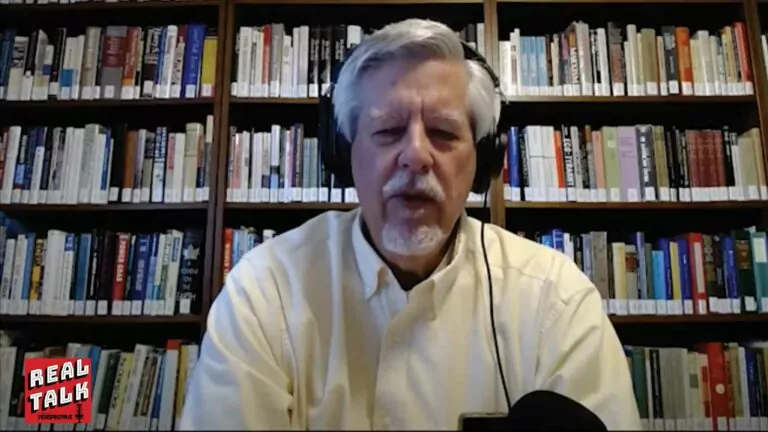Chatting with the Cornwall Alliance’s Dr. Calvin Beisner
This is an overview of a recent episode of Lucas Holvlüwer and Tyler Vanderwoudes’ Real Talk podcast. Real Talk is a bi-weekly podcast of Reformed Perspective featuring great conversations on everything from propaganda to pornography, and if you haven’t checked it out already, you really should. And you really can, at www.RealTalkPodcast.ca.
****
Is climate change real, and if so, how should Christians think about it? How should we take care of God’s creation in a way that still allows us to use its resources for the good of the crown of creation, mankind? Lucas Holtlüwer recently sat down with Dr. Calvin Beisner, founder and national spokesman for the Cornwall Alliance for the Stewardship of Creation (CornwallAlliance.org), to talk about these and other issues.
Dr. Beisner summarized the Cornwall Alliance’s work in a memorable tagline: “Our work is to defend the planet from the people who are trying to defend the planet.” More formally, it is a network of about 70 Christian theologians, natural scientists, economists, and other scholars educating for Biblical earth stewardship, economic development for the poor, and the proclamation and defense of the good news of salvation by God’s grace.
The climate is always changing
Beisner started with a summary of how the earth’s climate is constantly changing: daily of course, with high and low temperatures, seasonally each year, and also in decades-long cycles driven by different ocean tides and oscillations. Geologists are certain the earth was significantly warmer than today for a few thousand years prior to Christ’s birth, as well as during periods of the Roman empire, and of the Middle Ages. During multiple cooling periods over the last 2,000 years, glaciers have covered much of the world in ice before receding again over centuries.
“We’re in an ice age now, although most people don’t realize it, and that’s because Greenland is covered by ice for the most part, and Antarctica is covered also…. All of these [periods of cooling and warming] happened entirely naturally: there were no SUVs running around burning diesel, and so the human influence had essentially nothing to do with those.”
Beisner points to the United Nations Framework Convention on Climate Change in 1992 as one of the first times that the phrase was re-defined to mean changes driven primarily by human activity, especially the emission of carbon dioxide into the atmosphere.
Change, but not catastrophic
He believes that mankind’s activities do contribute to climate change, but to a very small degree, and that modern technology has an enormous net economic and life-sustaining benefit to human beings that is worth the relatively small effect on the climate.
Beisner made the case that the alarmist language and dire predictions of today’s environmentalists do not come from actual scientific climate studies, with their measured tones and scientific language. Rather, these reports are summarized by government bureaucratic appointees, and they tend to push more alarmist mentalities than the reports themselves.
“Crisis, danger, catastrophe, existential threat; [these terms are not in the reports. But they get added] by environmentalist activist organizations, and by the mainstream media, and by politicians because that’s the kind of language that can get people on board for spending trillions of dollars to solve a problem, whereas, if you speak in very measured moderate scientific terms, you won’t get that kind of support.”
Warring worldviews
Holtvlüwer asked if Christians in general were less worried about climate change because of the worldview of those who were sounding the alarm. Beisner agreed that non-Christian views such as pantheism, materialism, and animism are prevalent in the environmentalist movement, and contribute to the dangerous error warned about in Romans 1.
“When you deny the Creator, you begin to worship the creature instead of the Creator… You elevate the earth to the supreme concern… Paul tells us what happens when you do that. God gives you over to a reprobate mind, professing yourself to be wise you become a fool, and you fall into all kinds of different errors, both intellectual and moral… I think that’s a large part of why… there is a great deal of really shocking folly in much environmental thought.”
Seeing babies as blessings
From a Biblical perspective, we are called to “fill the earth and subdue it” (Genesis 1:28).
“Rather than seeing the earth as delicate, but nurturing, we see it as robust: very tough, very resilient, self correcting. But, dangerous, unless subdued, unless mastered, and that means that instead of trying to minimize our impact on the world, we don’t maximize it, but we optimize it… to enhance the fruitfulness and the beauty and the safety of the earth for human well-being as well as for the glory of God.”
Dr. Beisner pointed out that human deaths from natural catastrophes have actually dropped 95% in the last one hundred years – during the exact period that mankind’s impact on the climate is the greatest it has ever been. Why is this? Man’s prosperity and technological advances have allowed us to build safer homes and businesses, to heat and cool our dwellings, and to travel long distances in relative safety. So, rather than decry the slight impact we have had on the planet’s climate, we should encourage the development of greater wealth, of even safer structures, and of other means by which humans can live long and productive lives.
The current rate of warming, stated Beisner, is much lower than often portrayed, and may actually have positive effects on our ability to farm more efficiently in larger areas of the world:
“The benefits of this sort of warming are going to outweigh the risks! There may be some problems here and there, but I think it will be much less expensive to adapt to those than to try to control them.”
Bigger problems
“So should the church not be concerned about climate change, because there are bigger problems?” asked Holtvlüwer. Beisner believes that,
“there are going to be some problems that come with human-induced climate change, and that we should be aware of those, and we should be trying to deal with them by mitigation… or by adaptation.”
Beisner laid out some likely scenarios as sea levels and temperatures are likely to rise in the coming decades and centuries, but put these in the context of human adaptation as has been the case in the past. In short, there is nothing new under the sun, and part of our mandate as God’s creatures is to subdue the earth, to use its resources in a responsible manner as stewards of creation.
According to Beisner, the Cornwall Alliance does not advocate government subsidies for alternative energy sources such as wind and solar. Although there is a place for this type of energy use, the tax dollars of citizens are better used in the limited role that government should play, and the free market should be allowed to work out what energy sources are the most efficient and economical over time. “Nuclear, large-scale hydro, fossil fuels (such as) coal, oil and natural gas would far outstrip wind and solar not just now but for decades, possibly generations, to come.”
To dig deeper
Dr. Beisner also gave his opinion on the work and writings of Danish author Bjorn Lomborg, expressing his support for most of Lomborg’s views, but disagreeing with the responsibility of government to incentivize alternative energy sources. In the rest of the podcast, Holtvlüwer and Beisner also discussed the overall idea of environmental conservation, and touched on the situation faced by farmers in the Netherlands – who are dealing with new government restrictions on the use of vital fertilizers – along with their protests.
Overall, this is a very helpful podcast for Christians who wish to think Biblically and reasonably about climate change and environmentalism, and well worth the 90 minutes of listening. You may even find yourself rewinding and pausing, as you look up statistics and the Cornwall Alliance website for confirmation of the data and studies cited. Real Talk is published twice per month and can be found at ReformedPerspective.ca, RealTalkPodcast.ca, YouTube, and many podcasting platforms.
Listen to the whole 68 minute episode below.












